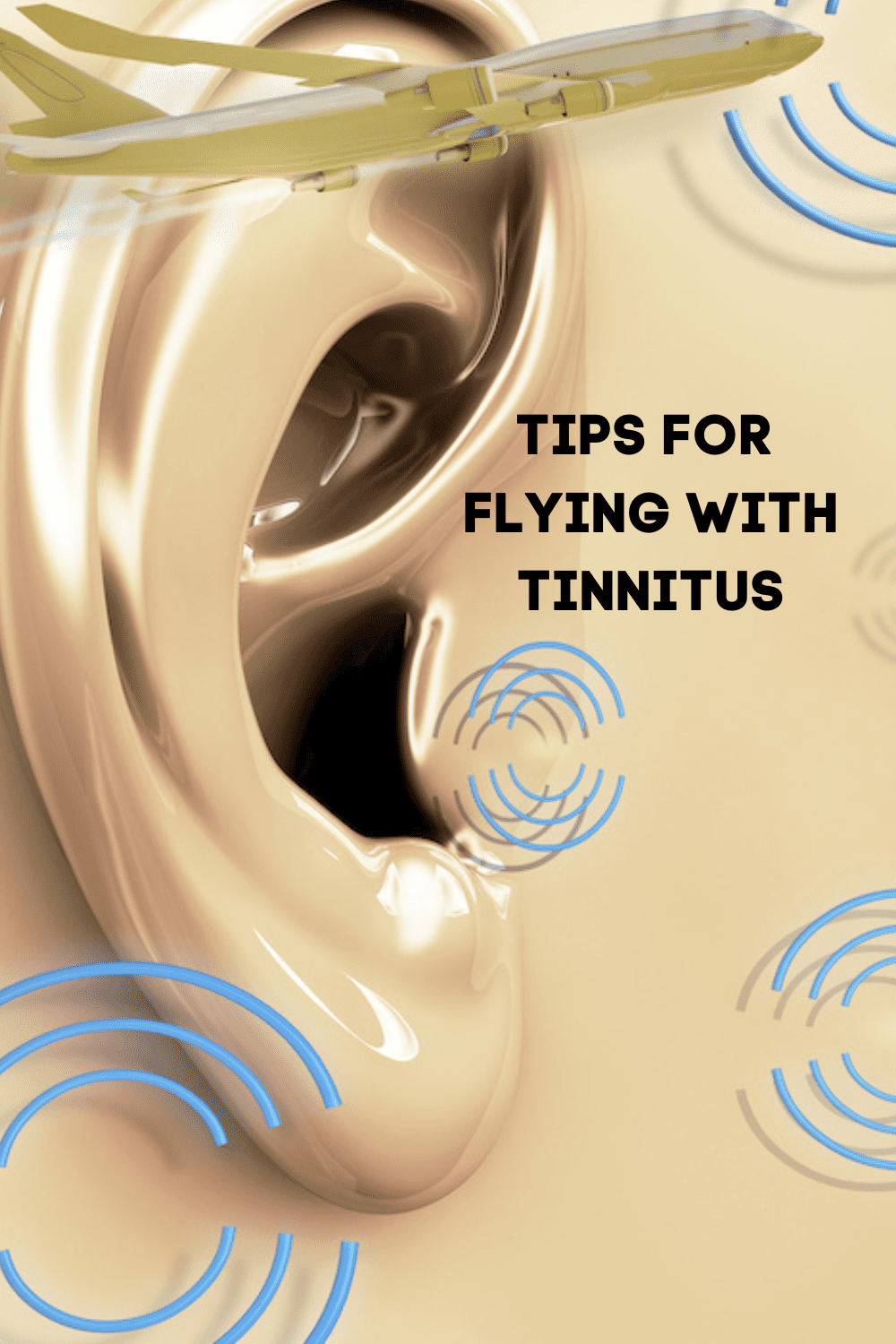Flying With Tinnitus: Travel Tips

Many people get nervous prior to or during a trip, especially when air travel is involved. These anxieties are often compounded when someone suffers from tinnitus. They may wonder how flying with tinnitus will affect their ears and what they can do to prevent problems.
What is tinnitus?

Tinnitus is the medical term for the unpleasant sensation of hearing ringing in one or both ears—-sounds that aren’t caused by anything external. The noise can take different forms including clicking, hissing, buzzing, whistling, or humming but most commonly, people with tinnitus hear low or high-pitched ringing.
One person’s tinnitus isn’t the same as another’s. For some, the condition persists; for others, it comes and goes. Some people find it very very annoying and disruptive, others less so.
According to the Mayo Clinic, tinnitus affects between 15 to 20% of the adult population, and its prevalence increases with age. Men are more likely to experience tinnitus than women. A Reddit board for the discussion of tinnitus has more than 32,000 members.
Tinnitus usually signals some type of problem with the auditory system. The most common causes can include hearing loss, ear and sinus infections, head or neck injuries that affect the inner ear, earwax blocking the ear canal, and certain types of medications including NSAIDs, antibiotics, cancer drugs, antidepressants, and even high doses of aspirin. The condition is sometimes one of the first signs of hearing loss.
And although the cause of tinnitus cannot always be identified, it is sometimes associated with an underlying medical problem that can be addressed. So if you are experiencing persistent tinnitus, it’s always prudent to consult with your physician to rule out something more serious and to get advice for managing the condition.
Ears and travel, in general

Many people with or without tinnitus commonly experience ear pain on a plane’s ascent or descent, a usually time-limited malady commonly called airplane ear.
This occurs when the Eustachian tube, the small passageway that connects the throat to the middle ear isn’t able to react to rapid changes in air pressure. Like the variability that occurs with tinnitus, some people experience “airplane ear” when flying and others don’t.
Read more about “Airplane Ear: What Travelers Need to Know About Flying and Ear Pain.”
Tinnitus and air travel

So should travelers with tinnitus worry about flying? Probably not.
“Even those with chronic tinnitus likely will not experience any changes in their tinnitus on flights and among those that do, the change is commonly temporary,” says Katie Ogden, the training manager of ReSound, a global company headquartered in Denmark (part of The GN Group) that develops hearing aids and other audio devices.
However, Ogden points out that if the Eustachian tube fails to do its job, tinnitus can be heightened when flying.
“If we also consider the cycle of tinnitus, it feeds off stress, which in turn feeds the tinnitus and so on,” she says. “For those who experience tinnitus that is linked to stress or anxiety—and have the same feelings towards flying—then it is logical that either building up to, or during a flight their tinnitus appears louder.”
“Tinnitus is an incredibly individual experience. So on the flip side, I have come across a small number of tinnitus sufferers who experience lower levels of tinnitus when flying due to the masking of the louder engine noise on the plane,” she adds.
Tips for flying with tinnitus

What can someone do to minimize the discomfort of tinnitus when flying?
- If you are someone who is bothered by engine noise, try to sit in front of the plane’s wing, where it tends to be quieter.
- If you wear hearing aids, these may help be helpful by increasing the volume of external noise so it masks the tinnitus.
- Wearing close-fitting earplugs may help by reducing pressure in the ear canal.
- Try to avoid flying if you have a cold; if you need to fly, take a nasal decongestant.
- Listen to music or take advantage of inflight entertainment, both for relaxation and distraction.
- Use other relaxation techniques, such as breathing exercises or meditation, to minimize stress. In more severe cases of anxiety, speak to your primary doctor before you travel.
“Even if it’s not medically serious, tinnitus can be troubling psychologically and have a big effect on the quality of your life,” writes health writer Sheryl Kraft in Healthy Women. “Living with constant noise that only you can hear and that you can’t control can play havoc with your emotions, leading to depression, anxiety, social withdrawal, sleep disturbances, and difficulty concentrating. And in a cruel twist of fate, these emotions can not only be a result of living with tinnitus, but they can also make the tinnitus worse,” she says.
Remember that there are effective ways to manage tinnitus and your anxiety, so before you fly, speak to your doctor and consider some general suggestions from the American Tinnitus Association.
Worth trying: A free download for Tinnitus Relief
The ReSound Relief app, available for free at the Apple App Store or on Google Play, for download on your smartphone, combines sound therapy and relaxing exercises to help manage tinnitus. The Google reviews from users are very positive.
SOURCES:
- Interview with Katie Ogden, ReSound
- Tinnitus, National Institute of Deafness and Other Communication Disorders
- Overview of Tinnitus: Mayo Clinic
- Treatment Options for Tinnitus: American Tinnitus Association
- Flying and The Ear: British Tinnitus Association
Save to Pinterest!!






